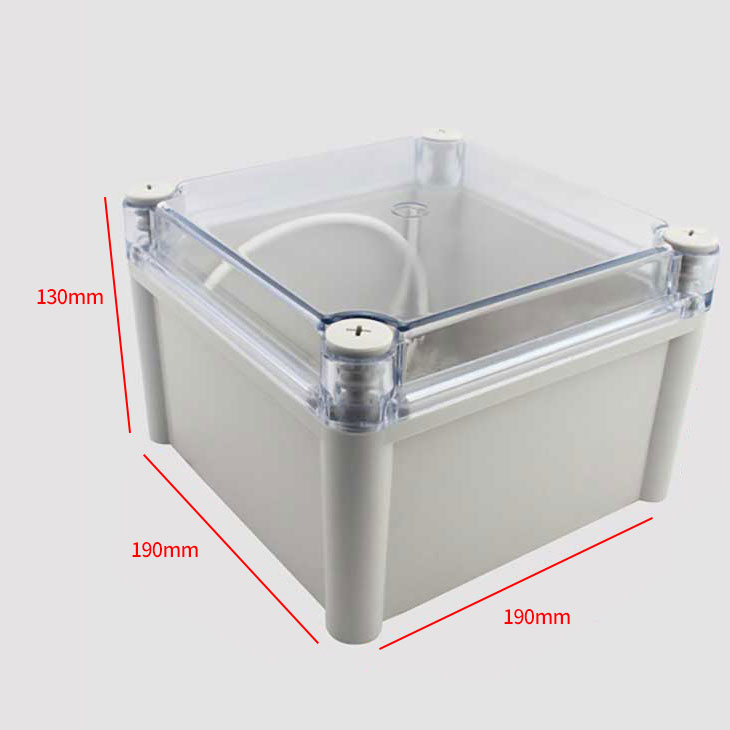Aluminum Enclosures: The Ideal Solution for Protection and Durability
2025-03-21
In today’s fast-paced technological world, protecting sensitive electronic components from external factors like moisture, dust, and physical damage is more important than ever. One of the best ways to ensure the safety and longevity of these components is by using high-quality enclosures. Among various materials used for enclosures, aluminum stands out as a top choice. Aluminum enclosures are widely used in industries such as electronics, telecommunications, and industrial applications due to their strength, lightweight nature, and resistance to environmental factors.
In this blog, we will explore the benefits of aluminum enclosures, their applications, and why they are an essential component in protecting your equipment.
What Are Aluminum Enclosures?
Aluminum enclosures are protective casings made from aluminum alloys that are designed to house electronic components, electrical equipment, and instruments. These enclosures come in various shapes and sizes to accommodate different types of equipment, from small circuit boards to larger industrial control systems.
What makes aluminum a preferred material for enclosures is its combination of durability and lightness, providing a high level of protection without adding excessive weight to the device or system. Aluminum enclosures are also easy to machine, allowing manufacturers to create custom designs and features tailored to specific needs.
Why Choose Aluminum for Enclosures?
1. Lightweight and Strong
Aluminum is known for its lightweight properties, making it ideal for enclosures that need to be both durable and easy to handle. Despite being lightweight, aluminum is incredibly strong and resistant to impact and pressure, ensuring that your equipment is safeguarded against physical damage during transport, installation, and daily use. This combination of strength and lightness makes aluminum enclosures perfect for a wide range of applications, from consumer electronics to industrial machinery.
2. Corrosion Resistance
One of the standout features of aluminum is its corrosion resistance. Aluminum naturally forms a protective oxide layer when exposed to air, which prevents further oxidation and protects the material from rust and corrosion. This makes aluminum enclosures particularly suitable for outdoor and harsh environmental conditions. Whether your equipment is exposed to humidity, rain, or chemicals, aluminum enclosures will help ensure that your components remain safe and operational.
3. Thermal Management
Aluminum is an excellent conductor of heat, which means it can effectively dissipate heat away from sensitive electronic components inside the enclosure. This is particularly important in electronic devices and industrial equipment, where overheating can cause components to fail or reduce their lifespan. The ability of aluminum enclosures to maintain an optimal temperature helps to improve the overall reliability and performance of the enclosed equipment.
4. Customizable Designs
Aluminum enclosures can be easily customized to meet the specific needs of different applications. Manufacturers can machine, cut, and shape aluminum into precise dimensions, creating enclosures that fit various equipment sizes and designs. Whether you need ventilation holes, mounting brackets, or cable glands, aluminum enclosures can be tailored to ensure that your equipment fits perfectly and operates optimally within the casing.
5. Aesthetic Appeal
Aside from being functional, aluminum enclosures also have an aesthetic appeal. The sleek, modern appearance of aluminum can enhance the visual appeal of your equipment, particularly in consumer electronics. The surface of the enclosure can be finished in various ways, such as anodizing, powder coating, or painting, which allows manufacturers to add color and texture to match branding or design preferences.
Applications of Aluminum Enclosures
1. Electronics and Electrical Equipment
Aluminum enclosures are commonly used in the electronics industry to protect circuit boards, power supplies, and other electrical components. Whether it’s a home appliance, audio equipment, or computing device, aluminum enclosures offer the ideal balance of protection, strength, and heat dissipation.
2. Telecommunications
In telecommunications, aluminum enclosures are used to house equipment like telecommunication panels, radio systems, and signal transmitters. These enclosures protect sensitive communication devices from weather elements, dust, and physical impact, ensuring uninterrupted operation and long-term reliability.
3. Industrial Control Systems
Aluminum enclosures are extensively used in industrial control systems to protect electrical control panels, sensors, and automation systems. In industries like manufacturing, oil and gas, and mining, where machinery is often exposed to harsh conditions, aluminum enclosures provide the necessary protection to ensure the equipment’s longevity and continuous operation.
4. Renewable Energy
The renewable energy sector, particularly in solar power and wind energy, benefits greatly from aluminum enclosures. These enclosures protect solar inverters, battery systems, and control panels from exposure to the elements. Given aluminum’s durability and resistance to the elements, it is an excellent choice for safeguarding renewable energy equipment that operates in outdoor environments.
5. Automotive Industry
In the automotive industry, aluminum enclosures are used for electronic control units (ECUs), sensor housings, and power distribution systems. The ability of aluminum to withstand both high temperatures and vibrations makes it ideal for automotive applications, where components are subject to constant movement and environmental challenges.
The Benefits of Aluminum Enclosures for Manufacturers
1. Cost-Effectiveness
While aluminum may not be the cheapest material on the market, it offers excellent value for money due to its long-lasting properties. The cost of maintenance and repairs for equipment housed in aluminum enclosures is minimal, thanks to the material’s durability and resistance to corrosion. Additionally, aluminum’s lightweight nature can reduce shipping costs and make handling easier.
2. Sustainability
Aluminum is a recyclable material, which means that aluminum enclosures can be repurposed at the end of their life cycle. This makes aluminum an eco-friendly option for manufacturers looking to reduce their environmental impact. Recycled aluminum requires significantly less energy to produce, making it a sustainable choice for environmentally conscious industries.
3. Quick Manufacturing Process
The manufacturing of aluminum enclosures is relatively quick, especially when using modern CNC machining and die-casting techniques. This allows manufacturers to produce high-quality, custom enclosures with short lead times, helping businesses meet tight production schedules and demand.
Conclusion
Aluminum enclosures offer a versatile, durable, and efficient solution for protecting sensitive equipment across various industries. Whether you're dealing with electronic devices, industrial machinery, or telecommunication systems, aluminum provides the perfect balance of strength, lightness, and resilience.
By choosing aluminum for your enclosures, you ensure that your equipment is not only safe from external elements but also operates efficiently, maintaining reliability and performance in challenging conditions. With customizable designs and excellent thermal management properties, aluminum enclosures are the ideal choice for safeguarding your critical equipment and extending its lifespan.



